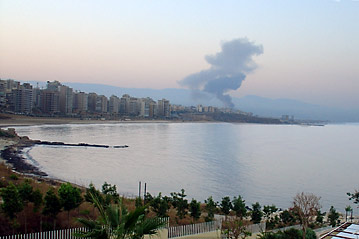Air strikes a major set-back to UNHCR operations in Lebanon
Air strikes a major set-back to UNHCR operations in Lebanon

BEIRUT, Lebanon, August 4 (UNHCR) - UNHCR's humanitarian aid efforts were largely on hold Friday after Israeli air raids left highway bridges destroyed in northern Lebanon and parts of southern Beirut under fire.
"By bombing one of the so-called humanitarian corridors from Al-Aarida to Beirut, the main supply route for humanitarian assistance has been destroyed," said Stephane Jaquemet, UNHCR's representative in Lebanon, referring to the crossing point on the Syria-Lebanon border.
"What has happened is a major set-back for our operations, and with the increasing fuel crisis in the country we feel we are heading towards a de facto blockade of the country," he added.
At least three bridges are reported to have been destroyed on the coastal stretch of the highway leading from Al-Aarida to Beirut via the city of Tripoli. A slum area to the south of the capital was also bombed after leaflets had been dropped warning of attacks.
UN convoys bringing aid and personnel from Syria have used the Al-Aarida route to get emergency relief supplies to Beirut and other parts of the country. UNHCR was trying to determine whether secondary roads could be used to enable teams to assess the needs of the displaced near Beirut and to transport aid to them.
Jaquemet said UNHCR's stockpile of emergency relief items within Lebanon was low because the agency had been distributing the aid as fast as it was coming in from Syria. The first UNHCR aid convoy from Syria - carrying 140 tonnes of relief items from a regional stockpile in Jordan - arrived in Beirut on July 29. There have been three more convoys since then and UNHCR has brought in a total 611.6 tonnes of aid, mainly blankets, mattresses and tents.
"We urgently need new supplies and even though we might be able to use some of the secondary roads through the mountains we will be faced with big delays and congestion on the road, which will severely hamper us from doing our work quick and effectively. Time is of the essence at the moment for the more than 900,000 displaced people," Jaquemet said.
UNHCR, which has set up a logistics centre in Larnaca, Cyprus, is looking at alternative ways of getting aid in by air and sea. The refugee agency is planning an airlift from Amman, Jordan to Beirut in the coming days.
The situation of hundreds of thousands of people displaced by the conflict in Lebanon - within the country and in neighbouring Syria - is becoming increasingly difficult as the crisis deepens. The massive displacement of people to the north of the country as they flee the conflict has put a huge strain on public shelter facilities - housing an estimated 130,000 people - and host families.
UNHCR is now working in seven governates north and south of Beirut, delivering relief supplies of blankets, mattresses, kitchen sets, hygiene items and supplementary food to thousands of displaced people in an effort to ease some of the problems people are experiencing in cramped conditions.
"Our teams report they are also finding people in communal shelters or even construction sites with almost no facilities. Host families, while tremendously generous, are also suffering from overcrowding," UNHCR spokeswoman Jennifer Pagonis told reporters in Geneva on Friday.
UNHCR teams have visited numerous families in isolated areas, which are housing on average 20-30 people. They note an overall lack of food, health care and adequate shelter. To ease the housing strain and decongest crowded schools due to reopen next month, UNHCR is working with the government and others to develop a tented camp for 800-1,000 displaced people in Beirut.
The refugee agency has been distributing mattresses, blankets, tents, kitchen sets and other items to thousands of people in Lebanon. But UNHCR fears that the fuel shortage will start to hamper relief efforts in the mountains, where local transport is used to deliver supplies.
Meanwhile in Syria, UNHCR continues to truck supplies from the regional warehouse in Jordan to the supply hub in Damascus. These supplies are earmarked for delivery both in Lebanon and Syria, but the latest developments threaten to plug the pipeline into Lebanon.
UNHCR teams monitoring four border points in Syria are reporting some 5,000 people a day arriving through northern border crossings with an estimated total of 140,000 Lebanese now in the country. Most of the arrivals are from southern Lebanon and the Bekaa area around Baalbek - a poor rural area of Lebanon - and have made the journey to Syria in stages.
UNHCR still remains under-funded for its Lebanon operation. The agency appealed for US$18.9 million for an initial three month period, but so far has received only US$9.4 million in confirmed donations.








